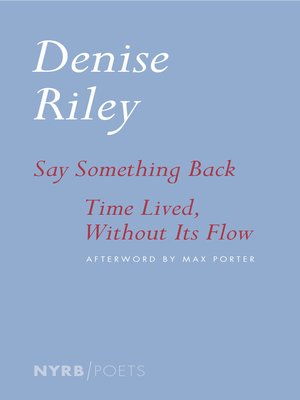
Sign up to save your library
With an OverDrive account, you can save your favorite libraries for at-a-glance information about availability. Find out more about OverDrive accounts.
Find this title in Libby, the library reading app by OverDrive.



Search for a digital library with this title
Title found at these libraries:
| Library Name | Distance |
|---|---|
| Loading... |
A moving meditation on grief and motherhood by one of Britain's most celebrated poets.
The British poet Denise Riley is one of the finest and most individual writers at work in English today. With her striking musical gifts, she is as happy in traditional forms as experimental, and though her poetry has a kinship to that of the New York School, at heart she is unaligned with any tribe. A distinguished philosopher and feminist theorist as well as a poet, Riley has produced a body of work that is both intellectually uncompromising and emotionally open. This book, her first collection of poems to appear with an American press, includes Riley’s widely acclaimed recent volume Say Something Back, a lyric meditation on bereavement composed, as she has written, “in imagined solidarity with the endless others whose adult children have died, often in far worse circumstances.” Riley’s new prose work, Time Lived, Without Its Flow, returns to the subject of grief, just as grief returns in memory to be continually relived.
The British poet Denise Riley is one of the finest and most individual writers at work in English today. With her striking musical gifts, she is as happy in traditional forms as experimental, and though her poetry has a kinship to that of the New York School, at heart she is unaligned with any tribe. A distinguished philosopher and feminist theorist as well as a poet, Riley has produced a body of work that is both intellectually uncompromising and emotionally open. This book, her first collection of poems to appear with an American press, includes Riley’s widely acclaimed recent volume Say Something Back, a lyric meditation on bereavement composed, as she has written, “in imagined solidarity with the endless others whose adult children have died, often in far worse circumstances.” Riley’s new prose work, Time Lived, Without Its Flow, returns to the subject of grief, just as grief returns in memory to be continually relived.







